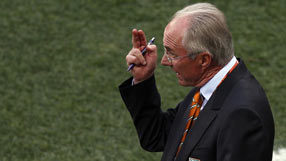
At the first World Cup to be held in the continent, only one of the six African teams had a home-grown coach - Algeria's Rabah Saadane. The rest were coached by a Frenchman, a Brazilian, a Serb and two Swedes.
"I've watched African qualifiers for years and noticed teams are often coached by Africans at that stage, but if they reach the finals they're replaced by foreign coaches," said Lito Vidigal, a former Angola international who currently coaches Portugal's Uniao Leiria.
"The federation chiefs sometimes want to distance themselves from the fallout if the side fails. They can say they hired the best on offer, from abroad," he told Reuters in a telephone interview.
Hosts South Africa are expected to appoint long-standing assistant Pitso Mosimane to replace Brazilian Carlos Alberto Parreira, but no decision has been announced yet.
FIFA President Sepp Blatter has criticised frequent changes of coaches at African sides, saying the constant chopping and changing causes weak tactics and wastes the continent's fine football talent.
But Vidigal said a lack of training and poor organization at African football associations made it difficult for a steady flow of home-grown coaches to develop.
"I'm often asked why African players can come to Europe and succeed while coaches don't," he said. "The players come here young, to improve. The coaches have to start in Africa and often there aren't the conditions to develop because the standard of organisation and infrastructures can be low."
The best features, fun and footballing quizzes, straight to your inbox every week.
"It is part of the wider issue of Africa's lag in relation to Europe, in terms of society, economy, every aspect of development.
"Angola, for example, just came out of a civil war, and the economy is now starting to grow. Let's hope football can follow suit," said Vidigal, 40, who was born in Angola but spent his playing career in Portugal.
At the age of 27, Vidigal was invited to play for Angola and accepted because he still had close ties to his homeland. His younger brother Jose Luis later earned 15 caps for Portugal.
The coach, who guided Leiria to ninth place in the Portuguese league this season, said the World Cup was positive for the continent because it had been trouble-free.
Five of the six teams were knocked out in the group stage, but Vidigal said their performances had given some reasons to be cheerful.
"The fact that Ghana have gone through to the last eight is a very good thing. And even South Africa's performances, despite their exit, were encouraging," he said.
